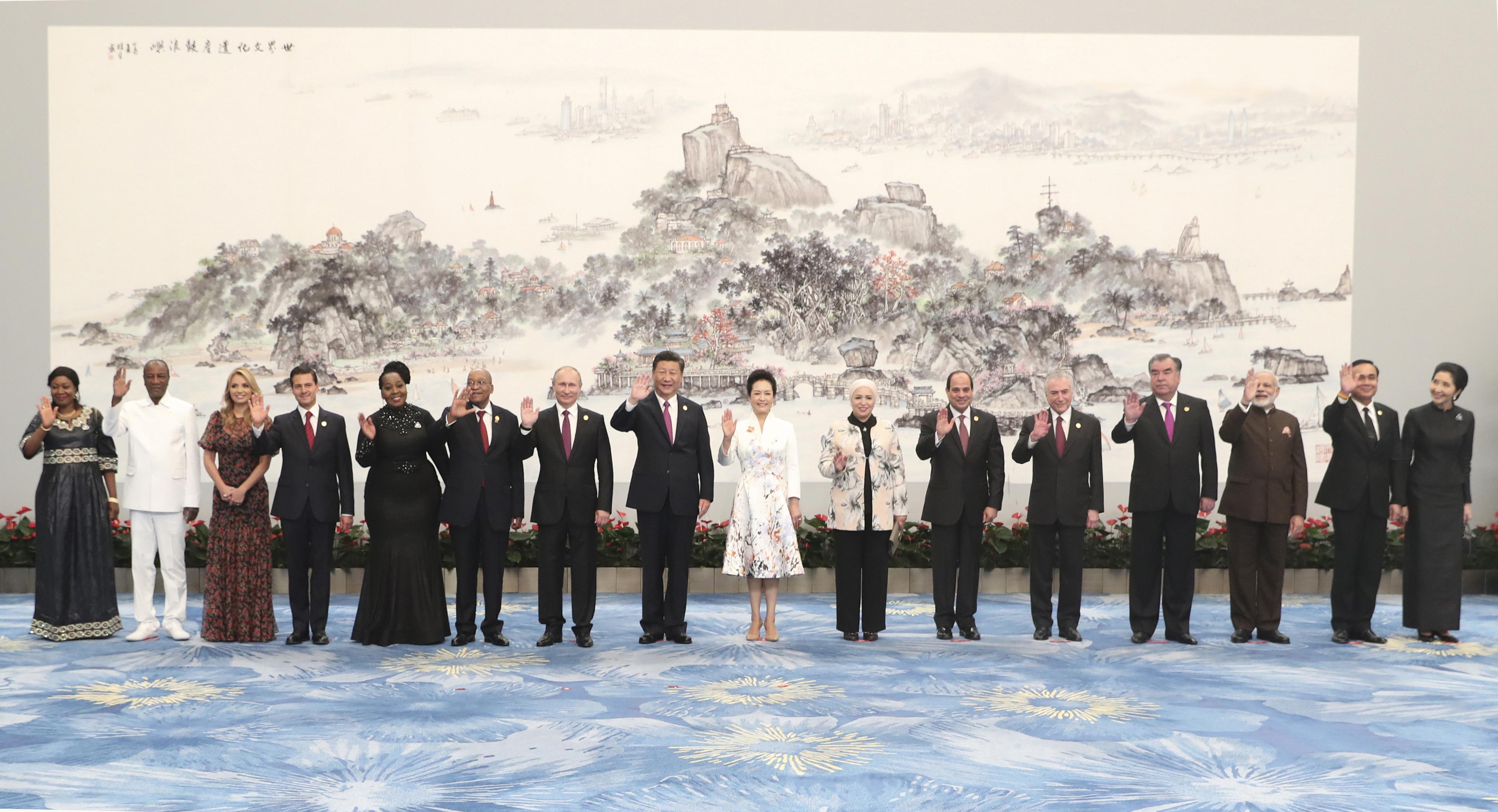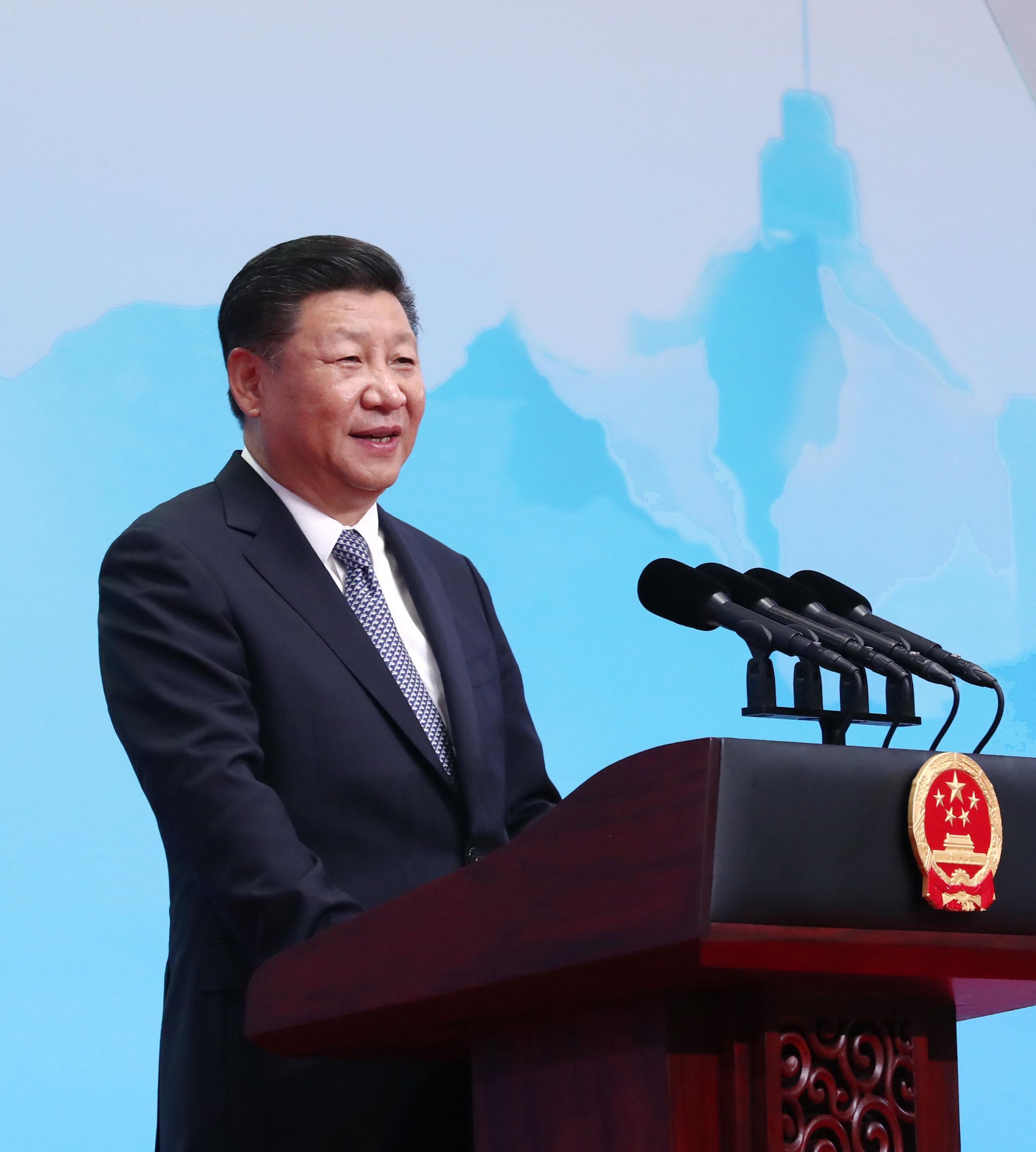Xu Lingui, Wang Cong & Zhang Yizhi (China Features)
In stormy waters it is common for fishermen in southeast China to set out to sea in groups.
Each boat has its own captain, but they will discuss fishing strategies when they return from a voyage. Over cans of beer, they argue but soon find common ground and set the time for the next sail.

Chinese President Xi Jinping and his wife Peng Liyuan pose for a group photo with leaders attending the ninth BRICS summit and the Dialogue of Emerging Market and Developing Countries and their spouses before a banquet in Xiamen, southeast China's Fujian Province, on Sept. 4, 2017. (Xinhua/Ma Zhancheng)
Leaders of the world's five major developing countries, Brazil, Russia, India, China and South Africa, were doing something similar when they met in Xiamen for the annual summit themed "BRICS: Stronger Partnership for a Brighter Future" in September.
In Xiamen, Xi Jinping chaired the BRICS summit for the first time as Chinese president. He debuted in the 2013 Durban summit on his first foreign trip as head of state, and has played an active role in the group ever since.
BRICS has always favored dialogue over confrontation, partnership over alliance, he said.
This wisdom has formed the spark of China's foreign policy with Xi at the helm. And it has been brought into BRICS cooperation.
RESPONSIBLE BLOC

Chinese President Xi Jinping delivers a keynote speech at the opening ceremony of the BRICS Business Forum in Xiamen,
southeast China's Fujian Province, on Sept. 3, 2017. (Xinhua/Ju Peng)
BRIC was coined by former Goldman Sachs economist Jim O'Neill in 2001 to describe four emerging economies with fast growth and great potential. The framework took shape in 2006. Four years later, South Africa joined. BRIC grew into BRICS.
Initially formed on economic prowess, the group has increasingly found a common voice on thorny geopolitical issues.
In their joint declaration, BRICS leaders expressed "deep concern" over the ongoing tension and prolonged nuclear issue on the Korean Peninsula, saying that it should only be settled through peaceful means and direct dialogue.
The declaration also touched upon issues in Syria, Yemen, and the Israeli-Palestinian conflict.
One day earlier, Xi called on BRICS countries to shoulder their responsibilities in upholding world peace.
"We should take a constructive part in the process of resolving geopolitical hotspot issues and make our due contributions," he said.
With Xi, China has emerged as a responsible power on world stage. Looking to help empower the emerging countries, China has increased its responsibility in global governance from climate change to peace-keeping.

A panel discussion on blue economy is held during the BRICS Business Forum in Xiamen, southeast China's Fujian Province, on Sept. 4, 2017. (Xinhua/Li Xin)
In the years leading up to the Xiamen summit, China hosted the leaders of APEC, the G20, and countries participating in the Belt and Road Initiative.
Xi told the press after the summit that BRICS leaders agreed to deepen political and security cooperation and enhance mutual strategic trust.
OPEN ECONOMY
Economic cooperation remains at the foundation of BRICS, and Xi has been calling for openness and larger representation of the developing countries in global economic governance since his first BRICS summit appearance in 2013.

Egyptian President Abdel-Fattah al-Sisi (C) receives an interview with Chinese media in Cairo on Aug. 28, 2017. Egypt is willing to further contribute to the cooperation within the
BRICS framework, Abdel-Fattah al-Sisi told Chinese media before his trip to China for a BRICS summit. (Xinhua/Egyptian Presidency)
With anti-globalization and inward-looking mentality on the rise, Xi in Xiamen repeated his support for an open global economy, multilateral trade and fight against protectionism.
"Emerging market will be hurt most by protectionism," Xi said. "Openness, inclusiveness, and win-win cooperation are the only viable option."
Together, BRICS represented 23 percent of global GDP in 2016 and had contributed to more than half of global economic growth in the past decade. But it has not all been plain sailing, as demand shrank, financial risks rose and commodity prices slumped.
Larissa Wachholz, a partner at Brazilian consulting firm Vallya, said Xi's focus on economic growth, win-win development and equal partnership is important to Brazil.
The Brazilian economy just climbed out of recession in the first quarter of 2017.
Xi announced at the summit that China will offer 500 million yuan (about 76 million U.S. dollars) to facilitate practical cooperation in economy and trade, and another 4 million dollars for projects of the BRICS New Development Bank, a Shanghai-headquartered body set up in 2015 as the bloc's major contribution to the world financial system.
Opening the BRICS Business Forum, Xi also encouraged BRICS countries to pursue innovation-driven development created by smart manufacturing, the digital economy and sharing economy.
This came no surprise to Lenovo chairman Yang Yuanqing, who is all too aware that China is leading the world in Internet technology.
The digital economy, with a market scale worth 22.6 trillion yuan, has risen to take up 30 percent of GDP in China.
Meanwhile, leading Chinese tech companies are expanding overseas.
In India, Alibaba's subsidiary partnered with local mobile payment company Paytm and boosted its number of users from 30 million to 200 million, the company said.
"Chinese companies are willing to share their experience as they explore the overseas market," Yang said. "Seizing the opportunities of the digital revolution, BRICS can achieve impressive growth and overtake developed countries."
BRICS PLUS
Leaders of Mexico, Egypt, Tajikistan, Guinea and Thailand were invited by China to sit at a roundtable with BRICS leaders.
Though outreach programs have existed in past BRICS summits since 2013, it was the first time the program had such an extensive representation - from almost every region of the world.
Xi said BRICS cooperation was more than about just five countries, but carried the expectation of the entire international community.
Xi said BRICS leaders supported the "BRICS Plus" approach proposed by China to strengthen South-South cooperation.
People all over the world are beginning to realize the sheer potential of BRICS for cooperation among developing countries.
"BRICS is really going to shock people in terms of what is able to achieve," said South African businessman Iqbal Surve.
Xi called out to his colleagues: "Let us set sail from Xiamen and join hands to usher in the second 'golden decade' of BRICS cooperation." Enditem
